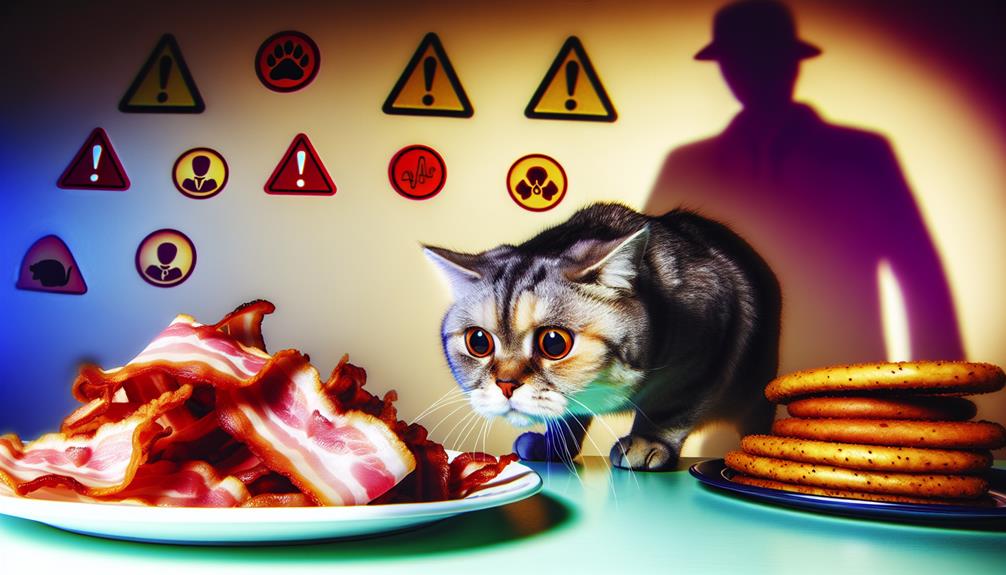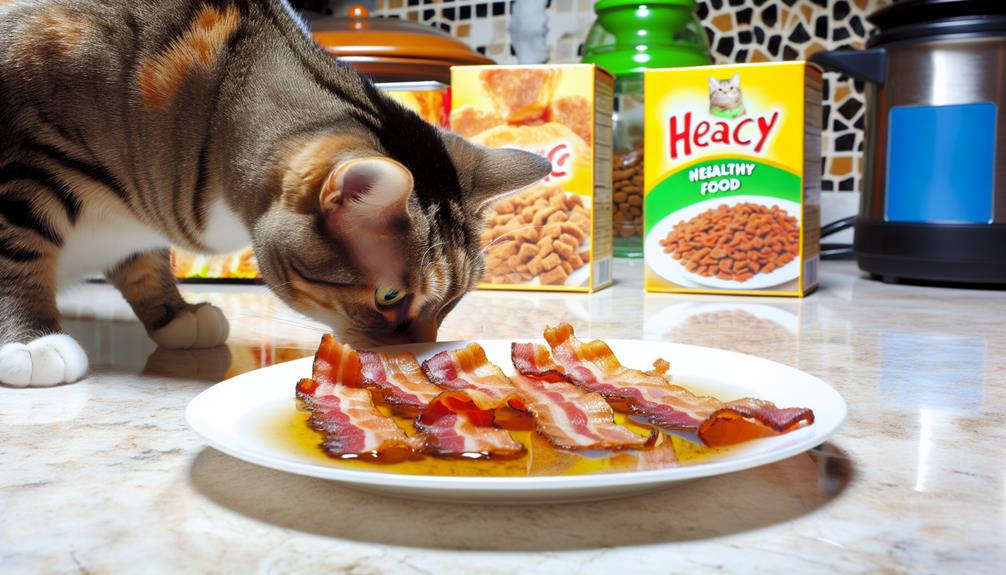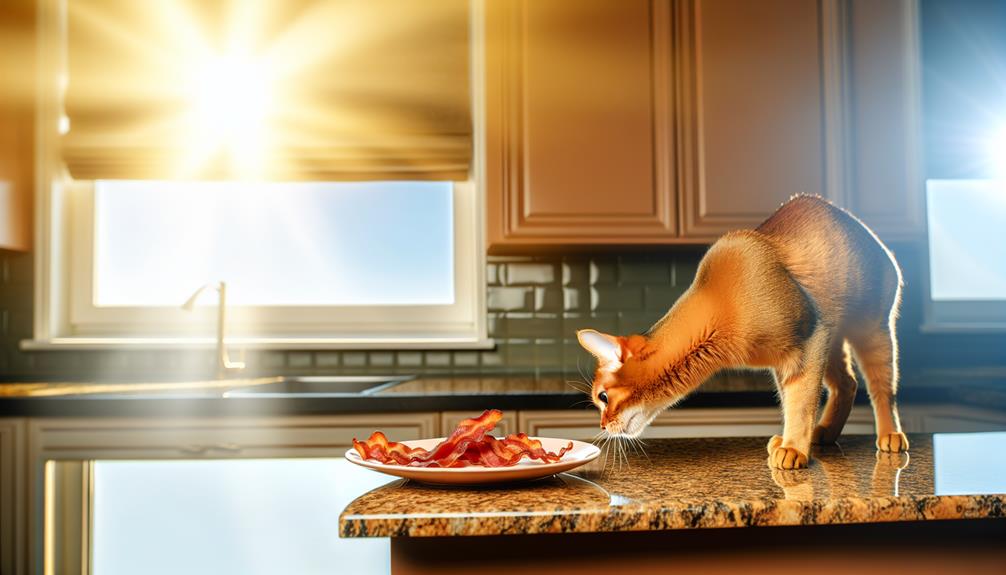Imagine your cat's eyes lighting up like sparklers at the scent of sizzling bacon. You're probably wondering if a small piece would harm your feline friend. While cats can technically eat bacon, there are significant health risks involved, primarily due to its high fat and sodium content. These ingredients can lead to serious issues like obesity and pancreatitis in cats. But is there a way to safely share a treat with your furry companion without jeopardizing their health? Let's explore the nutritional considerations and safer alternatives that might just satisfy both you and your cat.
Nutritional Content of Bacon
Understanding the nutritional content of bacon is vital for making informed dietary choices. When you're contemplating bacon preparation, it's important to recognize the nutritional elements that could impact your cat. Bacon, primarily composed of pork belly, is high in fat and sodium, which are significant factors to take into account for both humans and animals. A typical slice of bacon contains approximately 42 calories, 3 grams of fat, and 137 milligrams of sodium. These values can vary based on the type of bacon and its preparation method, such as frying or baking.
Cats' preferences for bacon can be influenced by its high-fat content and savory aroma. However, just because your cat shows interest doesn't mean it's a suitable option. The high-fat content in bacon can lead to obesity and pancreatitis in cats, while excessive sodium can cause sodium ion poisoning, leading to symptoms like vomiting, diarrhea, and even seizures. It's important to be aware of these risks when evaluating bacon as a treat.
Moreover, bacon preparation often involves curing processes that introduce additional chemicals like nitrates and nitrites. These compounds are used to preserve the meat and enhance its flavor but can be harmful to cats if consumed regularly. The preservatives and additives in processed bacon can contribute to long-term health issues, including cancer and organ damage.
Cats' Dietary Needs
To guarantee your cat's health, you need to focus on their essential nutrient requirements, which include a proper balance of protein and fat. Cats are obligate carnivores, meaning their diet should be rich in animal-based proteins. Additionally, maintaining adequate hydration is vital, as cats often don't drink enough water on their own.
Essential Nutrient Requirements
Cats have specific dietary needs that are indispensable for maintaining their overall health and well-being. To guarantee your feline friend thrives, it's essential to provide a well-balanced cat food that contains all necessary nutrient sources. Cats require a diet rich in vitamins, minerals, and crucial amino acids to support their unique physiology.
| Nutrient | Importance | Common Sources |
|---|---|---|
| Taurine | Vision and heart health | Meat, fish |
| Vitamin A | Immune system, vision | Liver, fish oils |
| Calcium | Bone health, muscle function | Bone meal, dairy products |
Cats can't synthesize certain nutrients on their own, making it imperative to choose a high-quality commercial cat food formulated to meet their specific dietary requirements. Taurine, for instance, is essential for preventing heart disease and guaranteeing proper vision. Vitamin A is another indispensable nutrient, playing a significant role in maintaining a healthy immune system and proper vision.
Protein and Fat Balance
Balancing a cat's protein and fat intake is essential for maintaining ideal health and energy levels. Cats are obligate carnivores, meaning their primary nutritional needs come from animal-based protein sources. High-quality proteins, such as those found in chicken, turkey, and fish, provide the essential amino acids required for muscle maintenance, immune function, and overall vitality.
However, protein alone isn't enough. Fats play a significant role in a cat's diet, providing concentrated energy and aiding in the absorption of fat-soluble vitamins like A, D, E, and K. The types of fats matter too. Omega-3 and Omega-6 fatty acids, found in fish oil and poultry fat, support skin health, coat condition, and inflammatory response.
When considering whether bacon fits into your cat's diet, it's important to assess its protein and fat balance. Bacon does offer protein, but the fat content is mainly saturated, which isn't ideal. Excessive saturated fat can lead to obesity and other health issues. Therefore, while a small piece of bacon might seem like a tempting treat, it shouldn't replace high-quality, balanced protein sources and healthier fat types crucial for your cat's well-being.
Hydration and Water Intake
While balancing protein and fat is essential for your cat's diet, equally important is guaranteeing proper hydration and water intake. Cats are notorious for their low thirst drive, often not drinking enough water to meet their hydration needs. Consequently, it's imperative to provide multiple hydration sources to keep them healthy.
One effective way to encourage water intake is by incorporating wet food into your cat's diet. Wet food contains a higher moisture content compared to dry kibble, offering a dual benefit of nutrition and hydration. In addition, placing multiple water bowls around your home can make it more convenient for your cat to drink. Some cats also prefer running water, so consider investing in a cat water fountain.
The water benefits are numerous and essential. Adequate hydration aids in maintaining kidney function, helps in digestion, and supports overall cellular health. Dehydration can lead to serious health issues like urinary tract infections and kidney stones. Monitoring your cat's water intake and providing diverse hydration sources can greatly contribute to their well-being. Always guarantee fresh, clean water is available, and observe your cat's drinking habits to address any potential hydration issues promptly.
Risks of Feeding Bacon

When considering the risks of feeding bacon to your feline friend, it is crucial to understand that this processed meat can pose significant health hazards. Cats have specific dietary needs, and introducing bacon into their diet can lead to various complications. Bacon toxicity is a genuine concern due to the high levels of preservatives and additives used in its preparation. These substances can be harmful to a cat's delicate system.
One of the primary issues with feeding bacon to cats is digestive issues. Cats' digestive systems aren't designed to handle the high fat content found in bacon. This can lead to gastrointestinal distress, including vomiting and diarrhea. Additionally, the excess fat can contribute to more severe conditions such as pancreatitis, which is a painful and potentially life-threatening inflammation of the pancreas.
Here are some of the specific risks associated with feeding bacon to your cat:
- Bacon toxicity: The preservatives and additives used in bacon can be toxic to cats, leading to symptoms such as lethargy, weakness, and even poisoning.
- Digestive issues: High fat content can cause gastrointestinal upset, leading to vomiting, diarrhea, and potential dehydration.
- Pancreatitis: Excessive fat intake from bacon can trigger pancreatitis, a serious condition requiring immediate veterinary care.
- Obesity: Regular consumption of fatty foods like bacon can contribute to obesity, which in turn increases the risk of diabetes, joint problems, and other health issues.
Sodium and Cats
How much sodium is too much for a cat? Cats require a minimal amount of sodium in their diet, approximately 42 mg per day, but any excess can be harmful. Sodium sources like bacon are particularly problematic due to their high salt content. When your cat consumes too much sodium, it can lead to a variety of health issues.
Clinical evidence highlights that the sodium effects on cats can be severe and sometimes life-threatening. Here are the potential impacts of excessive sodium intake on your feline friend:
| Excessive Sodium Intake | Immediate Effects | Long-term Effects |
|---|---|---|
| Slightly elevated levels | Increased thirst | Hypertension |
| Moderate elevation | Vomiting | Kidney damage |
| High levels | Diarrhea | Heart disease |
| Very high levels | Seizures | Death |
Excessive sodium can cause increased thirst as the body attempts to dilute the salt concentration. Over time, this can strain the kidneys, leading to chronic kidney disease. Vomiting and diarrhea are common immediate reactions to moderate sodium elevation. If a cat regularly ingests high-sodium foods, it can suffer from hypertension and heart disease, considerably impacting its quality of life.
It's essential to monitor your cat's intake of sodium sources, especially processed meats like bacon. The sodium effects can be insidious and cumulative, making it easy to overlook the gradual deterioration of your pet's health. For this reason, it's best to avoid feeding your cat any high-sodium foods and stick to a balanced diet specifically formulated for feline nutritional needs.
Fat Content Concerns

Steering through the complexities of your cat's diet, it becomes evident that fat content is another vital factor to contemplate. Unlike humans, cats have specific dietary needs, and excessive fat intake can lead to several health concerns. Bacon, with its high-fat content, poses a significant risk to your feline friend.
Cats process fat differently than humans, and while they do need some fat for energy and essential fatty acids, too much can overwhelm their system. High-fat foods like bacon can lead to:
- Pancreatitis: An inflammation of the pancreas that can be triggered by fatty foods, causing severe abdominal pain and vomiting.
- Obesity: Excessive fat intake can quickly lead to weight gain, which is challenging to reverse in cats and can impact their overall health.
- Hepatic Lipidosis: Also known as fatty liver disease, this condition can be life-threatening and is more likely to occur in overweight cats.
- Digestive Issues: High-fat foods can cause diarrhea and other digestive disturbances, making your cat uncomfortable and potentially leading to dehydration.
Given these concerns, it's important to manage the fat content in your cat's diet carefully. Bacon alternatives should be considered to guarantee your cat receives balanced nutrition without the risk of excessive fat intake. Opting for treats specifically formulated for cats can help maintain their health and well-being. Always consult your veterinarian for personalized advice tailored to your cat's specific needs.
Understanding fat digestion in cats and the potential risks associated with high-fat foods like bacon can guide you in making healthier choices for your feline companion.
Safe Alternatives to Bacon
Finding safe alternatives to bacon for your cat can greatly enhance their diet without compromising their health. While bacon is high in fat and salt, there are healthier protein sources that can fulfill your cat's nutritional needs. Homemade treats can be an excellent option, allowing you to control the ingredients and guarantee they are safe for your feline friend.
One of the best alternatives is lean meats like chicken or turkey. These proteins are low in fat and provide essential amino acids that support muscle development and overall health. Simply cook the meat thoroughly and avoid adding any seasonings that could be harmful to your cat.
Fish, such as salmon or tuna, can also be a good source of protein and omega-3 fatty acids. However, it's vital to offer these in moderation due to their high levels of mercury. Always verify the fish is cooked and free of bones to prevent any hazards.
Eggs are another excellent protein source. They are rich in essential nutrients and can be served scrambled or boiled. Just make certain they are fully cooked to eliminate any risk of bacterial contamination.
For those looking for convenience, commercial cat treats are formulated to meet feline dietary requirements. Opt for treats that list meat as the primary ingredient and avoid those with excessive fillers or artificial additives.
Veterinarian Recommendations

When considering dietary changes for your cat, it's always prudent to seek veterinarian recommendations to guarantee their health and well-being. Veterinarians possess extensive knowledge about feline nutrition and can provide guidance grounded in both scientific evidence and clinical experience.
One key aspect that veterinarians evaluate is your cat's behavior and feeding habits. Cats have specific dietary needs, and sudden changes can impact their overall health. Veterinarians often recommend that treats, like bacon, should be given sparingly, if at all, due to their high fat and sodium content.
Here are some points that veterinarians may discuss with you:
- Nutritional Balance: Veterinarians emphasize the importance of a balanced diet tailored to your cat's age, weight, and health status. Bacon lacks essential nutrients that cats require.
- Health Risks: High-fat foods like bacon can lead to obesity, pancreatitis, and other health issues in cats. Veterinarians will likely caution against regular inclusion of such treats.
- Behavioral Impact: Introducing human food can alter your cat's feeding habits, potentially leading to picky eating or food refusal. Veterinarians advise maintaining a consistent diet.
- Safe Alternatives: Veterinarians can suggest healthier treat options that align better with your cat's nutritional needs, such as lean protein sources or specially formulated cat treats.
Consulting with a veterinarian guarantees that dietary changes are safe and beneficial. They can offer personalized advice considering your cat's specific health profile and behavior. By following their recommendations, you can make informed decisions that support your cat's long-term health and happiness.
Conclusion
You've got to guard your furry friend from fatty, salty snacks. While bacon's tempting taste might tantalize, it's teeming with health hazards. Opt for lean meats or specially formulated cat treats to meet your cat's nutritional needs without the risks. Always consult your vet before making dietary decisions. Prioritizing your pet's well-being guarantees they stay spry, strong, and satisfied. Remember, responsible feeding fosters a healthier, happier feline friend.
